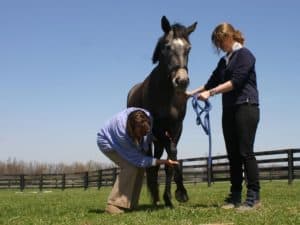Looking For Clenbuterol
Rumors have been floating across the country that trainers have found a new way to “assist” horses at winning—trans-tracheal or aerosol administration of clenbuterol. This drug is considered an adrenergic, which means it is activated by,
- Topics: Article, National & U.S. Legalities
Rumors have been floating across the country that trainers have found a new way to “assist” horses at winning—trans-tracheal or aerosol administration of clenbuterol. This drug is considered an adrenergic, which means it is activated by, characteristic of, or secreting epinephrine or related substances (Dorland’s Medical Dictionary). Epinephrine is a hormone secreted by the adrenal medulla and is a neurotransmitter released by some neurons. It is released in response to hypoglycemia, stress, and other stimuli. It is a potent stimulator of the sympathetic nervous system and a powerful cardiac stimulant that accelerates the heart rate and increases cardiac output. There are longer-acting adrenergic agents, such as clenbuterol, that are used as cilia augmentors and bronchodilators without the significant cardiostimulatory effects (Merck Veterinary Manual).
Ron Jensen, DVM, Equine Medical Director for the California Horse Racing Board (CHRB), said regulators across the country are aware of the rumors that clenbuterol is being used in Thoroughbred racehorses via the trans-tracheal or aerosol route. Laboratories across the country are trying to develop more sensitive methods to detect these rumored aerosol or injected-in-the-trachea administrations of clenbuterol in small doses.
“Regulators are aware of these rumors and are taking them seriously,” said Jensen. “We are doing research on administration with the rumored method of use and are looking at ways to develop more sensitive detection. We have called clenbuterol in the past at the IV dose and oral dose. When it is given IV or orally, it is detectable. We now are looking at low-level aerosol dosing.”
Jensen said backstretch security at CHRB tracks also has been increased along with increased laboratory testing and research
Create a free account with TheHorse.com to view this content.
TheHorse.com is home to thousands of free articles about horse health care. In order to access some of our exclusive free content, you must be signed into TheHorse.com.
Start your free account today!
Already have an account?
and continue reading.

Written by:
The Horse Staff
Related Articles
Stay on top of the most recent Horse Health news with












